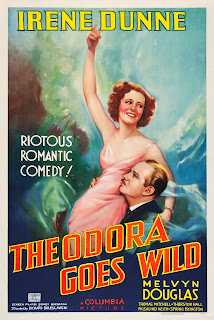Dunne plays Theodora Lynn, a church organist raised by her strict spinster aunts (Elisabeth Risdon and Margaret McWade) in a narrow-minded little town named for the Lynn family. Under the pseudonym Caroline Adams, Theodora is also the best-selling author of a racy romance novel, with heaps of money piling up in her bank account and her publisher (Thurston Hall) eager for a new book. Theodora's effort to keep her two lives completely separate becomes complicated once nosy, carefree illustrator Michael Grant (Melvyn Douglas) learns her secret and blackmails his way into her aunts' house. When Theodora finally "goes wild," Michael finds that his intervention has worked far better than expected, and with alarming consequences for everyone connected to her, including Michael himself.
The situation of a young person chafing under the constraints of life in a small, uptight town full of busybodies has enduring appeal, especially to those who experience it in real life, but the movie softens its criticism with scenes of berry picking, fishing, and other rural pleasures. Still, it won't make you want to relocate to Lynnfield, where self-righteous old women decry the liberal values of "civilization" and threaten to boycott the local newspaper run by Jed Waterbury (Thomas Mitchell) when he publishes the Caroline Adams novel as a serial. Theodora's aunts have great sway with this crowd as representatives of the Lynn family, but the worst of the lot is the gossipy, hypocritical Rebecca Perry, played with particular comedic malice by Spring Byington. Melvyn Douglas' Michael drops into the town like a bomb, and he quickly throws Theodora, her aunts, and the gossips into a tizzy. The rakish troublemaker is determined to dig Theodora up like a rosebush in her aunts' garden and see her transplanted into more suitable soil, preferably New York, where her literary talents and her youthful energy have room to breathe. As it turns out, Michael also needs some digging up, which Theodora proves only too happy to undertake.
Screwball comedies so often turn on the idea of the woman as a chaotic, disruptive force, and it's great fun to see that switched here, with Douglas gamely balancing the obnoxious and attractive elements of the role. His constant whistling is especially destructive of the Lynn family's peace, but his instant attachment to a stray dog speaks to his generous heart, so we know that he's really a good guy in spite of his antics. When their situations are reversed, Theodora takes on the role of the relentless saboteur with equal enthusiasm and a striking disregard for her own reputation. Dunne is absolutely hilarious throughout, whether she's in retreat from Douglas or on the attack, and it's easy to see how this performance launched her into comedy classics like The Awful Truth (1937) and My Favorite Wife (1940). In spite of the disapproving Lynnfield ladies, the entire movie cheers for modernity, women's liberation, and gender parity with palpable enthusiasm. Ironically, their two chief supporters are both old men: Waterbury, the newspaper publisher, is an unrepentant radical, and Theodora's Uncle John (Robert Greig) is an unreformed rake who encourages her to live as she pleases. The second half of the story establishes the perfect equality between the two protagonists and gives Theodora Goes Wild an especially satisfying conclusion, with a finale that scandalizes Lynnfield in uproarious fashion and flirts with the limits of the recently enforced Hays Code.
Richard Boleslawski's directorial credits include The Painted Veil (1934), Les Miserables (1935), and The Last of Mrs. Cheyney (1937); his sudden death in 1937 put a premature end to his career. A five-time nominee for Best Actress, Irene Dunne never won an Oscar but gained lasting fame in dramatic films like Show Boat (1936), Love Affair (1939), and I Remember Mama (1948), as well as her comedy roles. Melvyn Douglas won two Best Supporting Actor Oscars late in his career, for Hud (1963) and Being There (1979), and earned a Best Actor nomination for I Never Sang for My Father (1970), but be sure to see him in earlier pictures like Ninotchka (1939) and Mr. Blandings Builds His Dream House (1948). Nana Bryant has a small but very funny role as the book publisher's wife, Ethel Stevenson, which might tempt you to look for more of her in Brewster's Millions (1945) and Harvey (1950).
Theodora Goes Wild is currently available for streaming on The Criterion Channel.

I greatly enjoyed your review on this (in my opinion) underappreciated feature. I most recently saw it last year; it was the film selected one week for the Zoom movie meetup group I'm in, and it generated a lively and interesting conversation. I'm glad to see it getting the spotlight on the Criterion channel! Maybe this will result in more people discovering this gem.
ReplyDelete